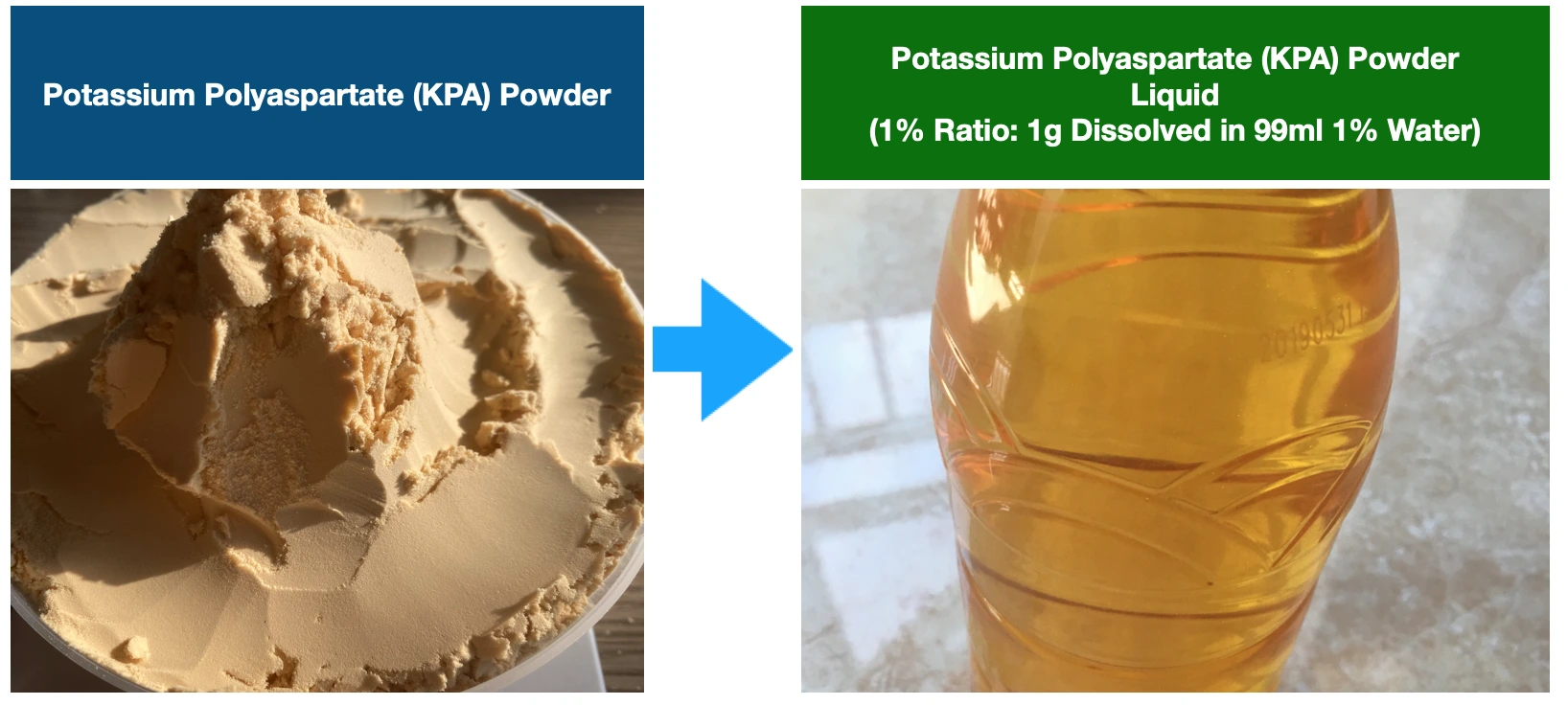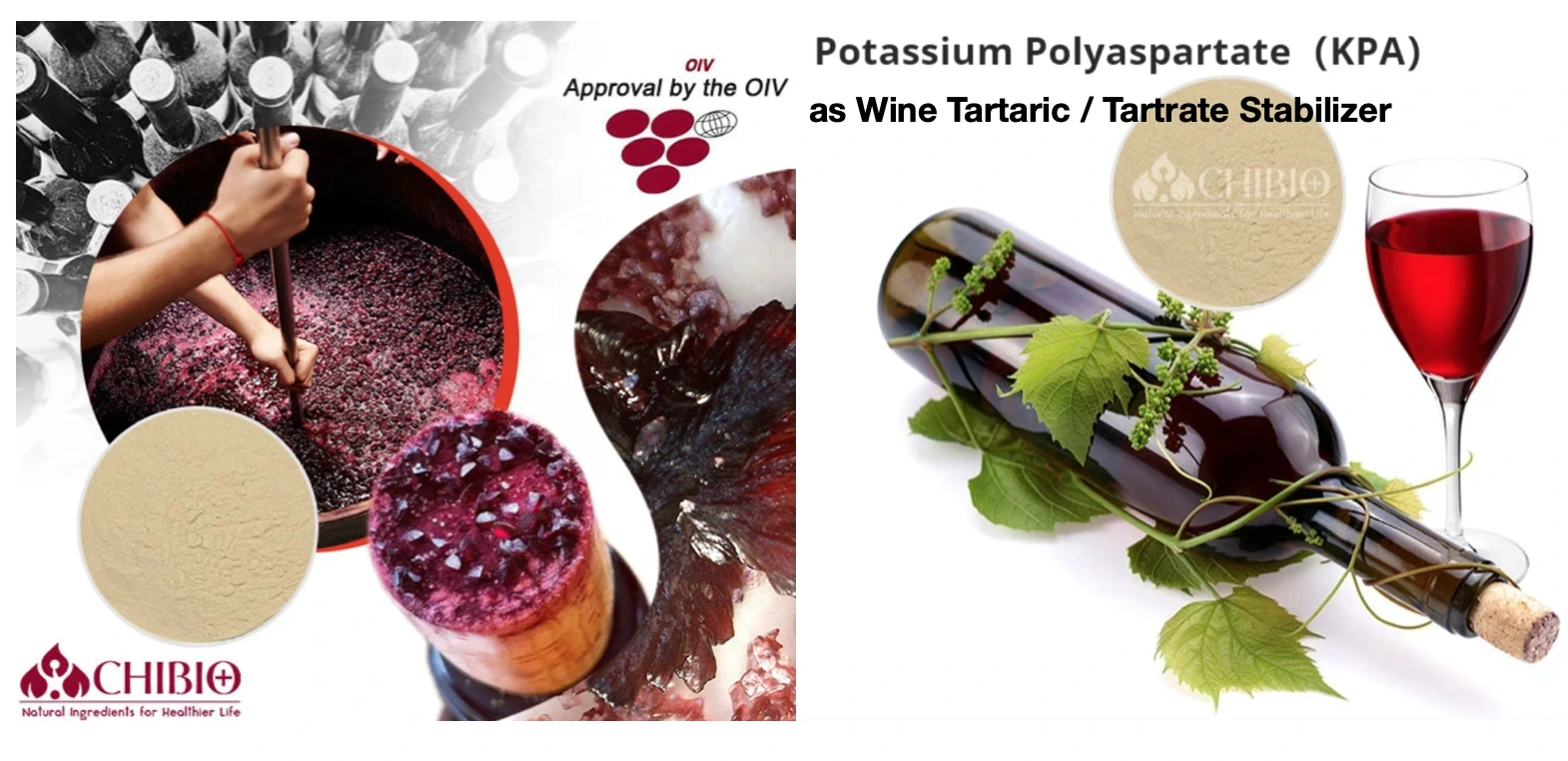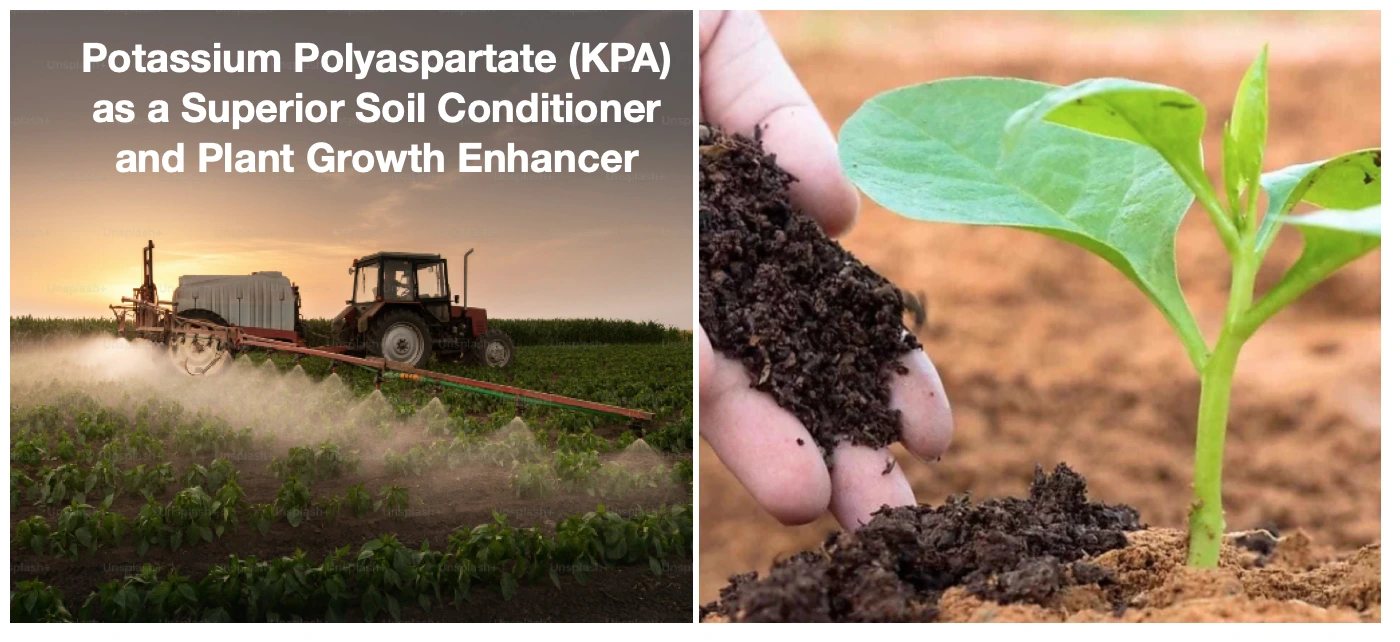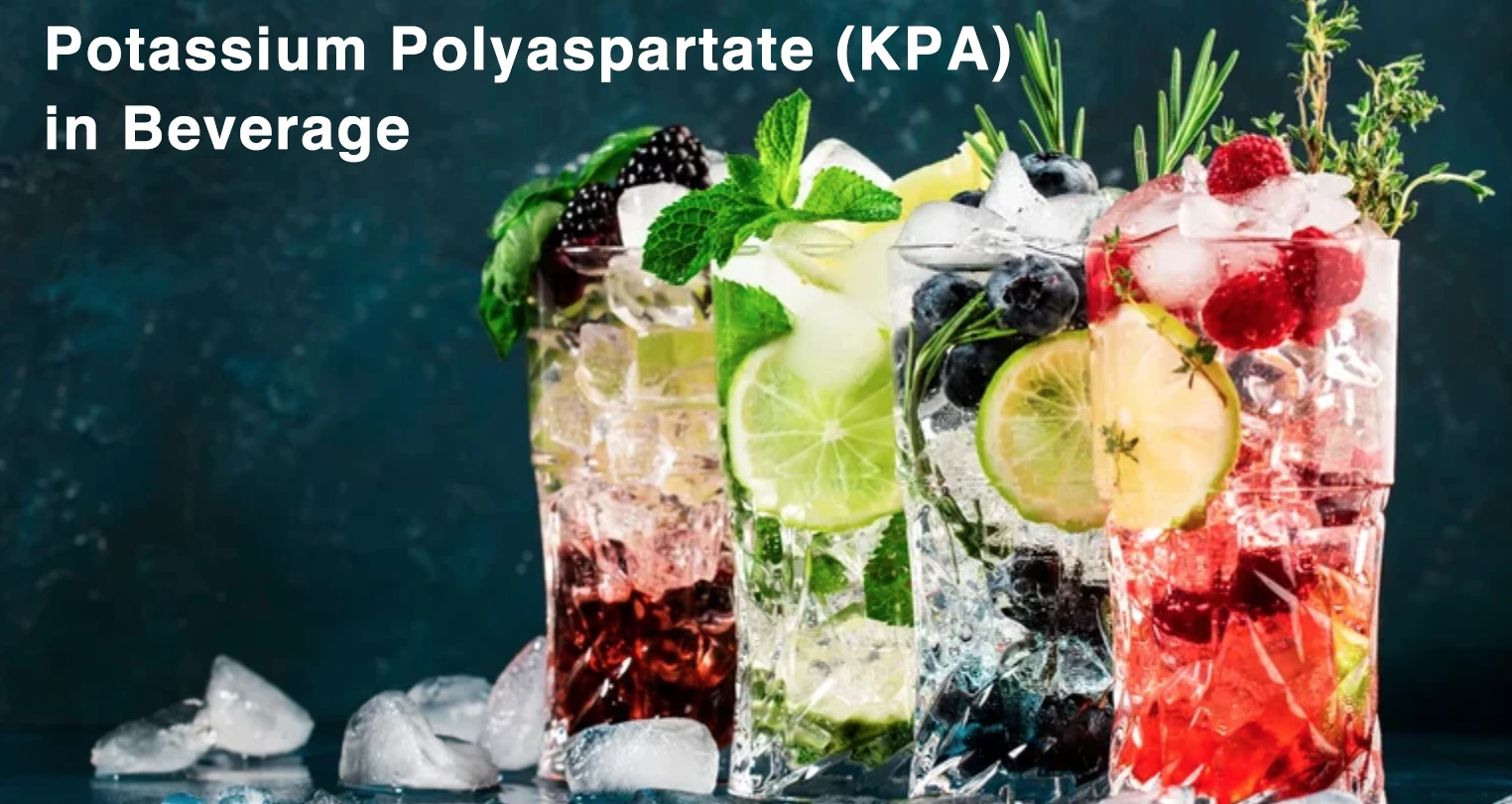Potassium Polyaspartate (KPA)
Potassium Polyaspartate (KPA)
Additional information
| Product Name | Potassium Polyaspartate (KPA), also known as Polyaspartic Acid Potassium Salt |
|---|---|
| Form | Light Yellow Powder |
| Assay | >90% purity |
| Solubility | Easily soluble in water, forming a clear, stable solution |
| pH | 7.0-8.5 |
| Molecular Weight | 5k-8k Da |
| Main Applications | In Wine: KPA as tartaric stabilizer approved by the OIV. |
Product Details
Potassium Polyaspartate (KPA): The Ultimate Solution for Wine Stability and Agricultural Excellence
What is Potassium Polyaspartate (KPA)?
Potassium Polyaspartate (KPA), also known as Polyaspartic Acid Potassium Salt, is a versatile, biodegradable polymer that has emerged as a game-changer in both the wine and agricultural industries.
As a food-grade stabilizer, Potassium Polyaspartate (KPA) is a tartaric stabilizer approved by the International Organisation of Vine and Wine (OIV) for use in wine. It is specifically designed to prevent tartrate crystallization, ensuring long-term clarity and stability without altering the wine’s taste, aroma, or color. As a biodegradable and eco-friendly alternative, KPA is a preferred choice for modern winemaking. Potassium polyaspartate(KPA) is effective for the Tartaric / Tartrate Stabilisation of wines.

In agriculture, KPA serves as a superior soil conditioner and plant growth enhancer, promoting healthier crops and sustainable farming practices.
Benefits and Functions of Potassium Polyaspartate (KPA)
- Biodegradability; More environmentally friendly
- More respectful of the sensory qualities of wine
- A high stabilizing capacity, with a long-lasting effect
- No negative interaction with wine color
- No changes in the sensory properties of the wine
- Renewable, Inexhaustible, Traceable Consistent Quality
- Wine Stabilization: KPA is specifically designed to prevent the formation of potassium bitartrate crystals in wine, eliminating unsightly sediment without altering the taste, aroma, or color of the final product. Its effectiveness means that winemakers can avoid cold stabilization, significantly reducing energy consumption and production costs.
- Agricultural Advantages: In agriculture, Potassium Polyaspartate improves soil structure, enhances nutrient absorption, and boosts plant resilience against environmental stresses. It is particularly effective in promoting root development and optimizing water usage, making it an invaluable tool for sustainable farming.
- Eco-Friendly: As a biodegradable and non-toxic polymer, KPA is environmentally friendly, leaving no harmful residues in soil or water systems.
Specification of Potassium Polyaspartate (KPA)
- Assay: >90% purity
- Appearance: Off-white to light yellow powder
- Solubility: Easily soluble in water, forming a clear, stable solution
- pH (1% Solution): 7.0-8.5
- Molecular Weight: 5k-8k Da
Solubility of Potassium Polyaspartate (KPA)

Potassium polyaspartate (KPA) is a water-soluble biopolymer, commonly used as a stabilizer in wine to prevent tartaric acid crystallization and Agriculture. Its solubility in water and other solvents is influenced by factors such as temperature, pH, and concentration.
Solubility of Potassium Polyaspartate:
- Water Solubility: KPA is highly soluble in water, making it ideal for use in food and beverage applications, including wine stabilization. It dissolves easily without forming residues or turbidity in most cases.
- pH Influence: KPA’s solubility can be influenced by pH levels. In slightly acidic environments, such as wine (with a pH around 3-4), it remains soluble and stable, maintaining its effectiveness.
- Temperature: Higher temperatures can enhance the solubility of KPA in water, similar to most water-soluble polymers.
In summary, KPA is highly water-soluble, making it effective for applications requiring dissolution in aqueous environments, such as wine.
Videos of Potassium Polyaspartate (KPA)
|
https://youtu.be/4h5XTWJacPA |
|
https://youtu.be/ZJ0XYq9HvrY |
|
https://youtu.be/4ThPxsIvE74 |
|
https://youtu.be/8dX-yheW8AI |
|
https://youtu.be/JbZtp99dbxQ |
Main Applications of Potassium Polyaspartate (KPA)
- Wine Industry:
- KPA is widely used as a tartrate stabilizer in the winemaking process to prevent tartrate crystal formation, ensuring that every bottle of wine maintains its clarity and visual appeal throughout its shelf life.
- Potassium polyaspartate is the potassium salt of polyaspartic acid, produced from L-aspartic acid, which is a naturally occurring amino acid in wine, and potassium hydroxide (98% purity).
- Studies have verified that potassium polyaspartate has stabilizing properties similar to those of the metatartaric acid (MTA) and carboxymethylcellulose (CMC), but is much more stable over time as well as filterable and unaffected by heat, which maintains the quality of the wine while increasing its cellaring or storage potential (shelf-life).
- Further, it does not have negative impacts on the sensory properties, such as colour, of the resultant wine. It is a completely biodegradable environmentallyfriendly alternative to traditional polyanionic materials. Compared with physical stabilisation techniques such as cold stabilisation, electrodialysis and ion-exchange resins, use of potassium polyaspartate is labour, energy and water efficient, and hence cost competitive.

- Agriculture: In agriculture, KPA is used as a soil conditioner and plant growth promoter, enhancing nutrient availability, improving soil structure, and increasing crop yields. It is particularly beneficial in drought-prone areas due to its ability to optimize water usage.
- Potassium polyaspartate(KPA) is a chemical substance that is mainly used in agriculture in the field of green agricultural development, with the advantages of long-chain protein properties and anionic surfactants, etc.
- Fertilizers are used as carriers to make fertilizers in different dosage forms, as base fertilizers, follow-up fertilizers, and extra-root applications, through the enrichment of fertilizer nutrients by potassium polyaspartate(KPA).

- Beverage industries: Beyond wine, KPA shows potential in stabilizing various fermented and acidic beverages, including:
- Wine: Used in red, white, rosé, sparkling, and fortified wines to prevent potassium bitartrate precipitation and improve protein stability.
- Cider & Perry: Helps maintain clarity and stability by preventing unwanted crystal formation.
- Kombucha & Kefir: Can be applied in probiotic beverages to enhance stability and shelf life.
- Brewing & Spirits: Potential use in beer, mead, vinegar, and other fermented beverages to improve clarity and prevent sedimentation. (>>more details)
Production Flowchart of Potassium Polyaspartate (KPA)

- Raw Material Preparation: Select high-purity aspartic acid as the starting material.
- Polymerization: Conduct polymerization under controlled conditions to synthesize polyaspartic acid.
- Neutralization: Neutralize the polyaspartic acid with potassium hydroxide to form potassium polyaspartate.
- Drying: Dry the resulting product to obtain a stable, powdered form of Potassium Polyaspartate.
- Testing and Packaging: Conduct rigorous quality control testing before packaging the product for distribution.
How Does Potassium Polyaspartate (KPA) Work?
In wine, KPA works by inhibiting the nucleation and growth of potassium bitartrate crystals, ensuring that the wine remains clear and free from sediment.
In agriculture, KPA improves soil structure by enhancing cation exchange capacity, which helps retain essential nutrients and water, leading to healthier plant growth.
Dosage Guideline for Potassium Polyaspartate (KPA)

- Wine: Potassium polyaspartate is thus proposed for use as a stabiliser against tartrate crystal precipitation in wine (red, rosé and white wine), sparkling wine and fortified wine at a maximum use level of 100-200 mg/L, depending on the level of instability of the wine to be treated.
- The European Food Safety Authority (EFSA) evaluated the safety of potassium polyaspartate as a food additive and in its opinion of 9 March 2016 (EFSA Journal, 2016)1 concluded that there was no safety concern from the proposed use in wine at a maximum use level of 300 mg/L and typical levels in the range of 100-200 mg/L.
- It has accordingly been approved and authorized for use as an additive for wine in the European Union (EU) in COMMISSION REGULATION (EU) 2017/1399 of 28 July 2017 amending Annex II to Regulation (EC) No 1333/2008 of the European Parliament and of the Council and the Annex to Commission Regulation (EU) No 231/2012 as regards potassium polyaspartate and COMMISSION DELEGATED REGULATION (EU) 2017/1861 of 2 August 2017 amending Regulation (EC) No 606/2009 as regards certain oenological practices).
- Agriculture: For soil conditioning, KPA is typically applied at a rate of 5-10 kg/ha. For foliar application, a solution of 0.1-0.5% is recommended.
Why Choose Chibio Biotech?
At Chibio Biotech, we pride ourselves on producing the highest quality Potassium Polyaspartate (KPA) with a purity of over 90%. Our state-of-the-art facilities and rigorous quality control processes ensure that every batch meets the stringent requirements of the wine and agricultural industries. With a commitment to sustainability and innovation, we offer customized solutions to meet your specific needs, backed by exceptional customer service and technical support.

Why Use Potassium Polyaspartate (KPA) in Your Business?
- For Winemakers: Ensure the clarity, quality, and shelf life of your wines while reducing energy costs and environmental impact.
- For Farmers: Enhance soil health, boost crop yields, and promote sustainable farming practices with a product that is safe for the environment and highly effective.
- For All: Potassium Polyaspartate (KPA) is not just a product; it’s a solution that delivers performance, sustainability, and peace of mind.
Choose Chibio Biotech for your Potassium Polyaspartate (KPA) needs, and elevate your business to the next level with a product that offers unparalleled benefits in both the wine and agricultural sectors. Contact us today to learn more and receive a customized quote tailored to your requirements.
Get in touch with us to boost your business

- Get Free Sample
- Get Step Quote
- 24/7 Service
- Customized Specification
- Confidentiality Agreement
Headquarter
Block B, Vanke Center, No.2 Heilongjiang South Road, Shibei District, Qingdao City, China 266033
Phone
+86 (0)532 66983270
Cellphone / WhatsApp / WeChat
+86 156 6577 2296
+86 133 8100 5417












